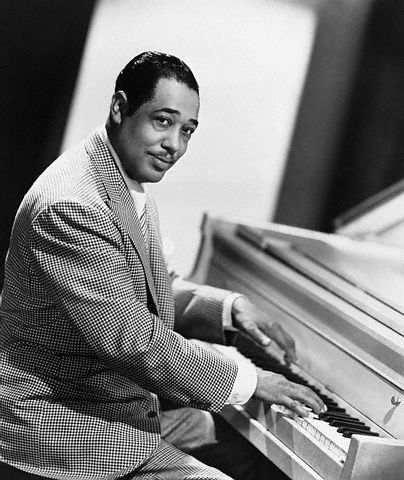Duke Ellington
Edward Kennedy Ellington was born April 29, 1899, in Washington, D.C. Ellington began piano lessons at the age of seven. He credits his childhood friend Edgar McEntree with naming him "Duke" proclaiming,"I think he felt that in order for me to be eligible for his constant companionship, I should have a title. So he called me Duke." Duke began performing professionally at the age of 17.
Ellington played throughout the Washington, D.C. area and into Virginia for private society balls and embassy parties. The band included Otto Hardwick, who switched from bass to saxophone; Arthur Whetsol on trumpet; Elmer Snowden on banjo; and Sonny Greer on drums. The band enjoyed the rarity of performing for both African-American and white audiences. Such a feat was uncommon in the racially segregated times.
After moving to New York in 1923, Ellington became one of the figures of the Harlem Renaissance. Ellington played mostly in Broadway nightclubs and led a sextet that grew in time into a 10-piece ensemble. He made 8 records in 1924, receiving composing credit on 3 including Choo Choo. In 1925, Ellington contributed 4 songs to Chocolate Kiddies, an all-African-American revue which introduced European audiences to African-American styles and performers.
Image source: http://www.metroactive.com/papers/sonoma/11.04.99/gifs/ellington-9944.jpg
Check out his early hits “East St. Louis Toodle-oo” and “Black and Tan Fantasy”:
Read the rest for more hits, and more info on Ellington.
Extended residencies at the Cotton Club in Harlem (1927–32, 1937–38) stimulated Ellington to enlarge his band to 14 musicians. Among his musicians were trumpeter Cootie Williams, cornetist Rex Stewart, trombonist Lawrence Brown, baritone saxophonist Harry Carney, alto saxophonist Johnny Hodges, and clarinetist Barney Bigard. Many of them were themselves important jazz artists which allowed Ellington to break away from traditional scoring. These exceptional musicians remained with Duke throughout the 1930s and allowed him to make hundreds of recordings, appear in films and on radio, and tour Europe in 1933 and 1939.
Take a music break and listen to a few more of the Duke's hits.
The Mooche-Duke Ellington & his orchestra
It don't mean a thing (if it aint got that swing)
Take the "A" train
The 1940s saw many of Duke's masterworks including “Concerto for Cootie,” “Cotton Tail,” “Ko-Ko,” “Main Stem” and “Harlem Air Shaft." Due to his inventive use of the orchestra, or big band, and thanks to his eloquence and extraordinary charisma, he is generally considered to have elevated the perception of jazz to an art form on a par with other traditional genres of music. Ellington's instrument of choice was the piano, but his skilled use of his orchestra propelled him to greatness as a jazz composer and bandleader.
One of my favorite tunes is "Mood Indigo"click here to listen.
Ellington also became a great song writer. He wrote great popular songs such as “Sophisticated Lady,” “Rocks in My Bed,” “Satin Doll” and many more. He also wrote motion-picture scores for The Asphalt Jungle (1950) and Anatomy of a Murder (1959) and composed for the ballet and theatre—including the show My People (1964), a celebration of African-American life. In his last decade he composed three pieces of sacred music: In the Beginning God (1965), Second Sacred Concert (1968), and Third Sacred Concert (1973).
Ellington was awarded the Grammy Lifetime Achievement Award in 1966. He was later awarded several other prizes, the Presidential Medal of Freedom in 1969, an Honorary PhD from the Berklee College of Music in 1971, and the Legion of Honor by France in 1973, the highest civilian honors in each country.
As one of the originators of big-band jazz, Ellington led his band for more than half a century, composed thousands of scores, and created one of the most distinctive ensemble sounds in all of Western music. Ellington's autobiography, Music Is My Mistress, was published in 1973. He continued to lead the band until shortly before his death on May 24, 1974. The Pulitzer Prize Board bestowed a special posthumous honor upon Ellington in 1999. In Washington, D.C. there is a school dedicated to his honor and memory as well as one of the bridges over Rock Creek Park.
Image source: http://s4.hubimg.com/u/136091_f520.jpg
It dont mean a thing...all you gotta do is swing!
HUSL Today Salutes Duke Ellington!




No comments:
Post a Comment